Omega-3 and Erectile Dysfunction: Benefits, Dosage, and Effect on Sexual Health
Written by Dr. Sharon Kumar

With a strong academic background in dentistry and clinical exposure, Dr. Sharon who has studied at PDM Dental College, brings a valuable blend of medical knowledge and communication skills to health content writing. She is passionate about creating clear, compassionate, and evidence-based content on topics such as general wellness, sexual health, oral care, and patient education. Her goal is to make complex medical information easy to understand, relatable, and genuinely helpful for readers seeking clarity on their health concerns. Dr. Sharon believes in the power of well-researched, empathetic content to educate and empower people to make better health decisions. Whether it’s writing about preventive care or breaking down myths in sexual wellness, her content always balances science with sensitivity.
•
September 22, 2025
Our experts continually monitor the health and wellness space, and we update our articles when new information becomes available.
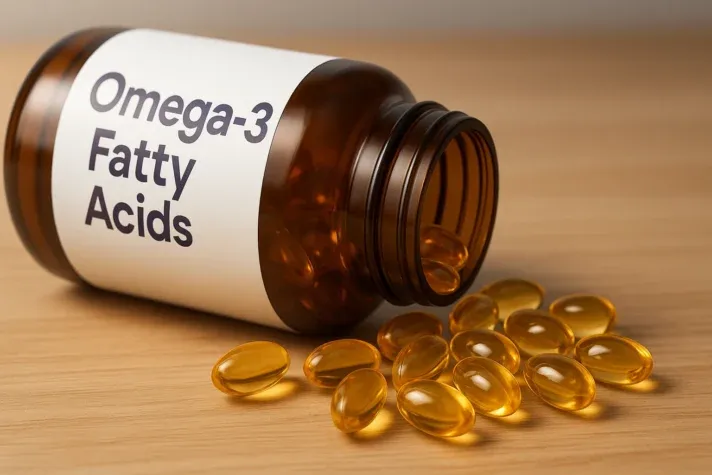
Quick Read
Omega-3 fatty acids, found in fish oil and plant sources like flaxseeds, can help improve erectile dysfunction (ED) by boosting blood circulation, reducing inflammation, and supporting heart health. For ED, a typical omega-3 dosage is 1,000–3,000 mg daily, providing essential EPA and DHA to enhance nitric oxide production, which helps relax blood vessels and improve erections. To benefit from omega-3 for erectile dysfunction, aim for two to three fish oil capsules daily or incorporate omega-3-rich foods into your diet. Always consult a healthcare provider for personalized advice, especially when combining omega-3 with other medications.
Erectile dysfunction (ED) is a condition that affects many men, causing difficulties in achieving or maintaining an erection. As men search for natural ways to improve their sexual health, omega-3 fatty acids have been part of the top lists. But how does omega-3 impact erectile function, and what is the omega-3 dosage for erectile dysfunction? Research shows that omega-3 fatty acids are found in fish oil, flaxseeds, and other sources. They may help improve blood circulation, reduce inflammation, and support heart health. These benefits are important for good erectile function. [1] Recent clinical trials have demonstrated that omega-3 supplementation can improve male sexual performance by more than 23% in some cases.[2] The link between omega-3s and ED is rooted in their ability to enhance blood vessel health and vascular function, which directly affects erection quality. This article will explore the omega-3 dosage for erectile dysfunction. It will discuss the benefits of omega-3 for erection health. It will also explain how to add these fatty acids to your daily routine for better sexual wellness.
The Role of Omega-3 in Erectile Dysfunction
- Omega-3 fatty acids, particularly EPA (eicosapentaenoic acid) and DHA (docosahexaenoic acid), are important for overall heart health.
- Heart health directly affects erectile function. The body needs healthy blood flow to get and keep an erection and not cause erectile dysfunction.
- Omega-3s help by improving blood circulation. They reduce oxidative stress. Oxidative stress [3] happens when there are too many harmful molecules in the body that can damage cells, leading to various health problems.
Omega-3s are a powerful tool in improving circulation and reducing inflammation, both of which are essential for healthy erectile function."
- They also make blood vessels more flexible.
How Omega-3 Affects Vascular Health
- One of the main contributors to erectile dysfunction is poor blood flow to the penis, caused by endothelial dysfunction. Endothelial dysfunction [4] occurs when the lining of blood vessels doesn't work properly, affecting blood flow and potentially leading to heart and circulation problems.
- Omega-3 fatty acids help by supporting the endothelial cells in the blood vessels.
- These cells line the blood vessels and play a major role in regulating blood flow and pressure.
- Omega-3s help enhance nitric oxide production, a molecule that helps blood vessels relax and dilate, improving blood flow.
- This mechanism is vital for achieving a healthy and lasting erection.
Omega-3 and NO/cGMP Signaling
- Recent studies show that omega-3 fatty acids help improve nitric oxide (NO) levels in the body, which is key to getting and keeping an erection.[5]
- Nitric oxide helps blood vessels relax and widen, allowing more blood flow to the penis. Omega-3s boost the production of an enzyme called endothelial NO synthase (eNOS), which helps make more nitric oxide.
- By increasing nitric oxide, omega-3s support better blood circulation, which is essential for strong and lasting erections.
Fighting Oxidative Stress and Inflammation
- Omega-3s are powerful antioxidants that help fight harmful molecules in the body.
- They also reduce inflammation (swelling) by lowering markers like C-reactive protein [6].
- This helps protect the tissues in the penis from damage and supports healthy sexual function.
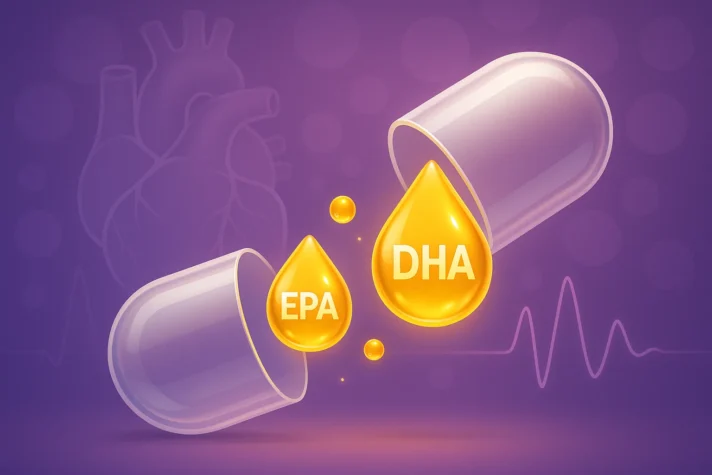
Omega-3 Dosage for Erectile Dysfunction
- If you're considering using omega-3s to improve your erectile health, the next question is: What is the proper omega-3 dosage for erectile dysfunction?
- The exact dosage can vary based on individual needs.
- Studies show that taking 1,000 to 3,000 mg of omega-3 per day usually helps support heart and erectile health. [6]
- Most fish oil supplements provide concentrations of 300 mg to 1,000 mg of EPA and DHA per capsule, so you may need to take 1–3 fish oil capsules daily to reach the desired dose.
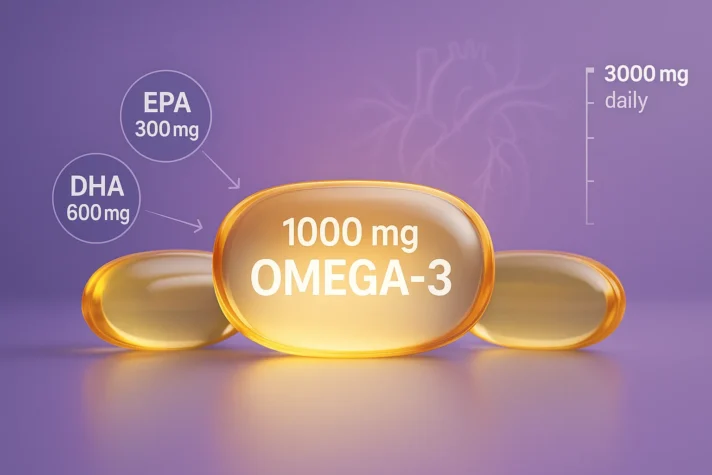
Factors Influencing Omega-3 Dosage
Several factors may influence the dosage that is right for you, including:
1. Age
Older people might need a higher dose because their blood flow is not as strong, and their hormone levels may be lower.
2. Existing health conditions
Those with underlying heart problems/cardiovascular issues, diabetes, or autoimmune disease may require more omega-3s.
3. Dietary intake
If you consume omega-3-rich foods like fatty fish, flaxseeds, chia seeds, or walnuts regularly, you may need a lower supplement dosage. It is a good idea to talk to a healthcare provider to find the best dosage for you. This is especially important if you take omega-3 supplements with other medicines.

Sources of Omega-3 Fatty Acids
Top Dietary Sources of Omega-3 Fatty Acids
The best dietary sources of omega-3s include:
- Fatty fish: Salmon, mackerel, sardines, and other cold-water fish
- Fish liver oil and cod liver oil (which also contain vitamins A and D)
- Plant sources: Flaxseeds, chia seeds, walnuts, and soybean oil
- Algae oil: A vegetarian alternative rich in DHA
For those who don't consume enough omega-3s through their dietary pattern, various supplements are available:
- Fish oil capsules: The most common form, typically containing EPA and DHA
- Krill oil: Contains omega-3s plus astaxanthin, a powerful antioxidant
- Algae oil: Suitable for vegetarians and vegans
- Omega-3 EPA concentrated supplements for specific therapeutic needs
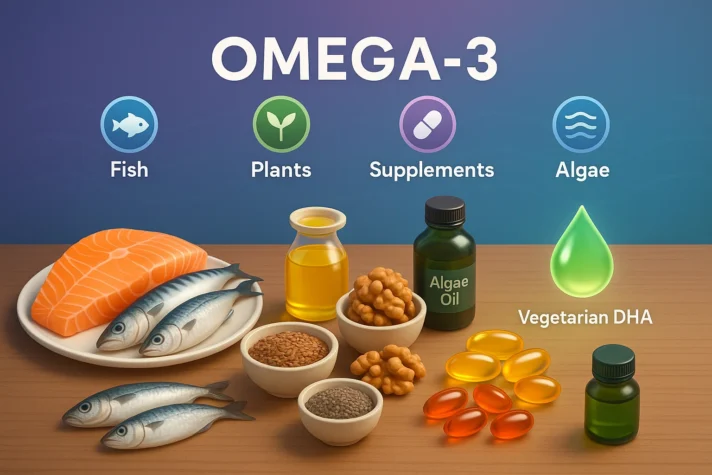
Other Benefits of Omega-3 for Men's Health
Omega-3s offer many benefits for sexual and reproductive health beyond just improving erections:
1. Heart Health and Blood Circulation
- Omega-3s are known to boost heart health by lowering cholesterol and blood pressure.
- They also reduce inflammation (swelling) and improve key ratios related to heart health (like monocyte-to-HDL and neutrophil-to-lymphocyte).
- A healthy heart ensures good blood flow throughout the body, including to the penis, which is important for better sexual performance.
2. Mental Health and Libido
- Mental health issues like depression and anxiety can hurt sexual performance, but omega-3s help improve mood.
- Studies show that omega-3s, especially EPA, can lower symptoms of depression and anxiety, which can otherwise reduce libido and sexual function.[7]
3. Fertility and Testosterone Levels
Omega-3s support male fertility by boosting testosterone levels and improving sperm health. They help:
- Increase sperm count and quality
- Improve sperm movement by supporting sperm cell membranes
- Enhance testicular (male sex organ producing sperm) function and size
- Regulate key hormones like LH (luteinizing hormone)[8] and FSH (follicle-stimulating hormone)[9]
These benefits can improve overall reproductive health.
4. Protection Against Environmental Toxins
- Omega-3s protect the body from harmful chemicals like Bisphenol F (BPF), found in plastic.
- They help maintain balance in the penis, preventing damage that could lead to sexual dysfunction.
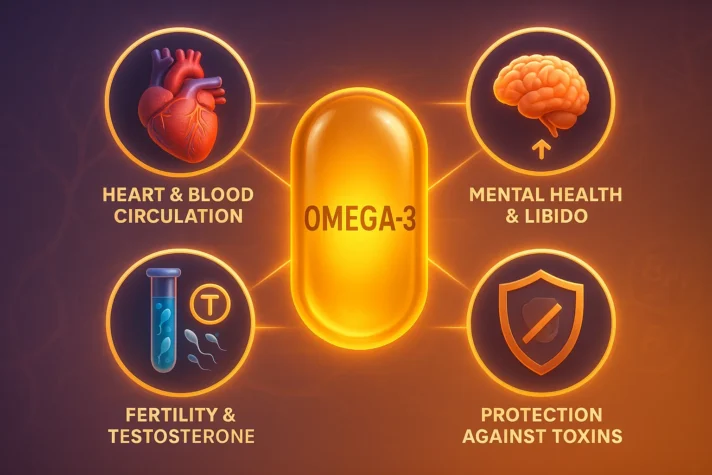
Clinical Evidence and Research on the Benefits of Omega-3 for ED
Recent clinical trials have provided compelling evidence for omega-3's benefits in treating erectile dysfunction. Data from the National Health and Nutrition Examination Survey and other studies using propensity score matching show consistent improvements in erection function. They also show better overall sexual health markers.[2] Machine learning analysis of large datasets has revealed that men with higher omega-3 intake show better sexual health outcomes and reduced risk of male infertility. These findings support the therapeutic potential of omega-3 fatty acids in treating various aspects of sexual dysfunction.[6]
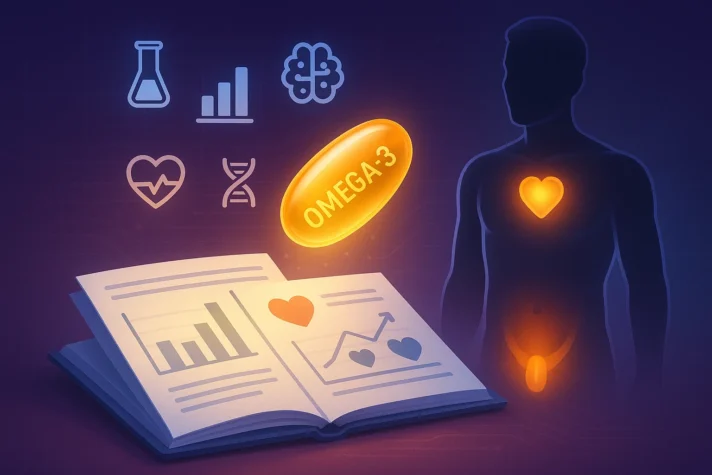
Practical Tips for Incorporating Omega-3 into Your Routine
To get the most out of omega-3 for improving erectile dysfunction, it’s important to make it a regular part of your routine. Here’s how to boost your omega-3 intake:
Eat Omega-3-rich Foods
- Add foods high in omega-3s to your diet, such as fatty fish like salmon, mackerel, and sardines, at least twice a week.
- You can also eat plant-based sources like flaxseeds, chia seeds, and walnuts.
Take High-Quality Supplements
- If you’re not getting enough omega-3s from food, consider taking fish oil or omega-3 supplements.
- Look for supplements with at least 500 mg of EPA/DHA per capsule, and choose ones that are third-party tested for purity.
Combine with a Healthy Lifestyle
- Omega-3s work even better when paired with a healthy lifestyle.
- Eating a balanced diet, exercising regularly, maintaining a healthy weight, managing stress, and avoiding smoking or excessive alcohol will help improve your sexual health.
Monitor for Side Effects
- While omega-3s are generally safe, some people may have stomach issues when starting supplements.
- To reduce the risk of side effects, start with a smaller dose and gradually increase it as your body gets used to it.
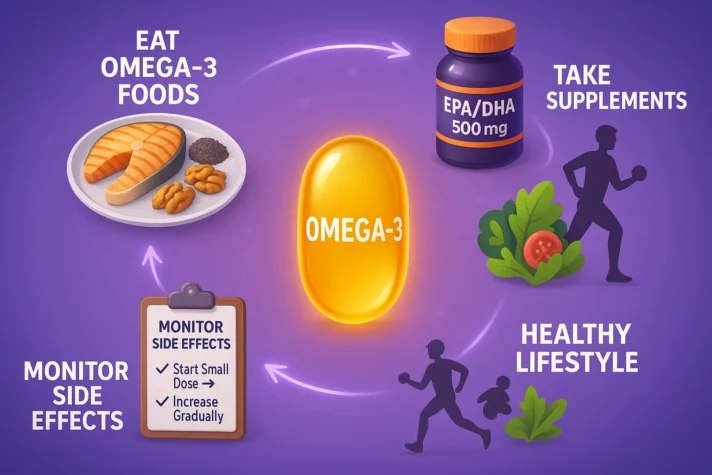
Conclusion
Omega-3 fatty acids play an important role in supporting both heart and sexual health. By improving blood flow, reducing inflammation, and boosting hormone balance, they can help men manage erectile dysfunction more naturally. Research shows clear benefits when taken in the right dosage, whether through food or high-quality supplements. For the best results, pair omega-3 intake with a healthy lifestyle and consult your healthcare provider to find the dosage that’s right for you.
Disclaimer
The following blog article provides general information and insights on various topics. However, it is important to note that the information presented is not intended as professional advice in any specific field or area. The content of this blog is for general educational and informational purposes only. The content should not be interpreted as endorsement, recommendation, or guarantee of any product, service, or information mentioned. Readers are solely responsible for the decisions and actions they take based on the information provided in this blog. It is essential to exercise individual judgment, critical thinking, and personal responsibility when applying or implementing any information or suggestions discussed in the blog.
Most Asked Questions
How long does it take to see results from omega-3 supplements for erectile dysfunction?
While individual results vary, most people notice improvements within 4–6 weeks of consistent omega-3 intake.
Can I get enough omega-3s from food alone for better erectile health?
Yes, fatty fish like salmon, mackerel, and sardines are great sources. If you're not consuming enough omega-3-rich foods, supplements can help fill the gap.
Are there vegetarian sources of omega-3 for erectile dysfunction?
Yes, plant-based sources like flaxseeds, chia seeds, and walnuts, as well as algae oil, can provide the omega-3s needed for sexual health.
Can omega-3 help with other aspects of sexual health besides erectile dysfunction?
Omega-3s can also support mental health, improve sperm quality, boost testosterone, and protect against toxins, all of which contribute to overall sexual wellness.
Is omega-3 effective for older adults with erectile dysfunction?
Yes, older adults may benefit from omega-3s due to their ability to improve circulation and support hormone levels, both of which can help with erectile function.
Sources
- 1.
Effects of Omega-3 Fatty Acids on Erectile Dysfunction in a Rat Model of Atherosclerosis-induced Chronic Pelvic Ischemia
- 2.
Prophylactic role of omega-3 fatty acids in bisphenol F-induced sexual and erectile dysfunction is associated with penile redox homeostasis
- 3.
Oxidative stress
- 4.
Endothelial dysfunction
- 5.
Omega 3 fatty acid improves sexual and erectile function in BPF-treated rats by upregulating NO/cGMP signaling and steroidogenic enzymes activities
- 6.
Omega 3 supplementation reduces C-reactive protein, prostaglandin E2 and the granulocyte/lymphocyte ratio in heavy smokers: An open-label randomized crossover trial
- 7.
Omega-3 Fatty Acids Supplementation in the Treatment of Depression: An Observational Study
- 8.
LH (luteinizing hormone)
- 9.
FSH (follicle-stimulating hormone)


